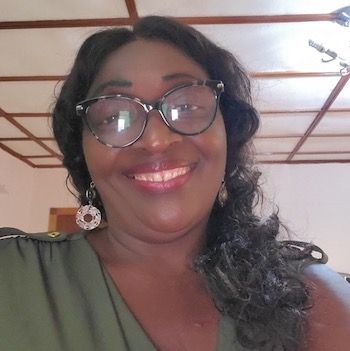Gertrude Gbessay Karimu

Summary: Gertrude Gbessay Karimu is the National Coordinator for the Women’s Network for Environmental Sustainability (WONES), an organisation that promotes the welfare of women and girls in Sierra Leone. She has faced serious emotional trauma due to the loss of some women’s lives in the 2017 Freetown mudslide, and she encounters continual opposition from male political leaders, but she is determined to empower women and girls, particularly in regard to environmental and land issues.
Profile: Gertrude Gbessay Karimu is the co-founder and national coordinator of Sierra Leone’s Women’s Network for Environmental Sustainability (WONES), a non-governmental, non-partisan, and development-oriented organization started in 2013. Its creation was prompted by the realization that Sierra Leone is constantly faced with the alarming negative effects of environmental degradation and climate change on communities, especially women in rural communities. These women are considered to be major providers and suffer the most, yet their voices are not heard in the planning, policy formulation, implementation, monitoring, and evaluation of environmental issues throughout the country.
This was what spurred Karimu and her colleagues to form WONES; they wanted to begin work in the rural areas of Sierra Leone, taking into account environmental and climate change issues that affect health, governance, and public awareness. They focused on stakeholder engagement, domestic and industrial energy, waste management and disposal, water resources management, and land use management, all the while promoting the empowerment of women to lead in the protection and management of the environment.
To achieve all of this, Karimu has established not only a women’s environmental network but also school nature clubs within communities in the western rural district of Freetown and Pujehun in the south of Sierra Leone. At a Citizens’ Conference on Land and the Constitution organized by Green Scenery in 2014, WONES called for the right of women to own land, describing the lack of that right as an abuse. The year before, Action Aid, COOPI, Oxfam, and Green Scenery released reports portraying vivid and practical instances of various levels of abuse against women.
Karimu also addresses corporate mining: “WONES works with women in rural communities and has keenly followed Environmental Social and Health Impact Assessments (ESHIA) concerning large-scale foreign mining and agricultural investments.”
Over the last decade, Karimu, through WONES, has helped over 500 women attain leadership roles in agriculture and entrepreneurship. She has often been faced with financial difficulty, and she constantly struggles to get women access to land—for either residence or agriculture—because of the traditional arrangement around land acquisition in Sierra Leone, i.e., land at the rural level belongs to chiefs and community people. In 2021, she engaged local chiefs in Pujehun District to provide land for women for Inland Valley swamps. The request initially received acceptance from the local chiefs, but after one planting season, the land was withdrawn. In fact, for most of the areas where Karimu works, she has been denied the land. Nonetheless, she continues her efforts in transforming the lives of women using her own finances and some donors that have supported her work.
In her efforts to achieve better living conditions for marginalised women who have experienced environmental consequences, Karimuru continues to advocate strongly for women’s empowerment through policy reforms. Some of this advocacy has included tracking the implementation of climate projects that seek to empower women within government. She has been discouraged many times by men. “Sometimes,” she says, “some men even use money on our women folk to not unite and succeed in uplifting us.” However, this has not dissuaded her from continuing her advocacy.
With her efforts toward climate justice, women’s rights, youth rights, and land rights, Karimu works with groups of women who have been negatively affected by climate incidents such as the 2017 mudslide in Freetown. Along with the nature clubs, she has given schools environmental cards, books, and megaphones embedded with environmental messages to promote awareness.
Karimu is dedicated to her work: “It’s the enthusiasm that women portray in solving their own problems within the local communities where I work that keeps me going.”
